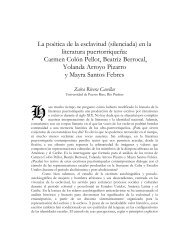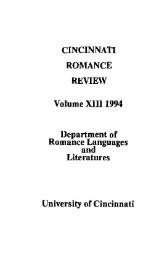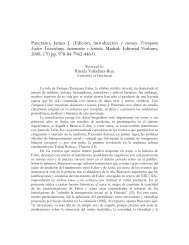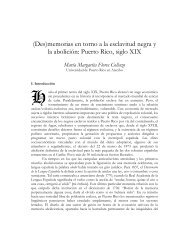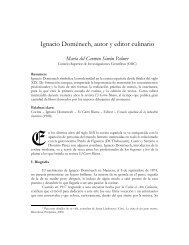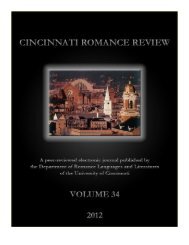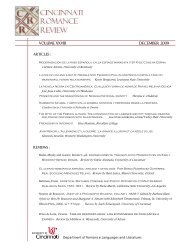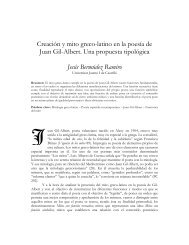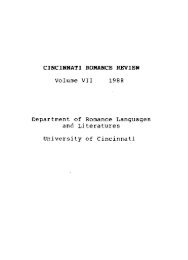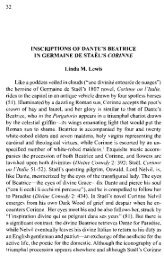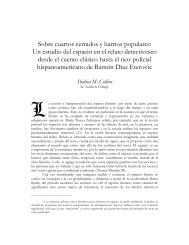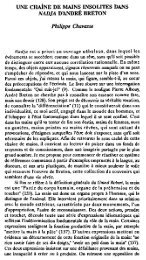Volume 30 (2011) - Cincinnati Romance Review
Volume 30 (2011) - Cincinnati Romance Review
Volume 30 (2011) - Cincinnati Romance Review
You also want an ePaper? Increase the reach of your titles
YUMPU automatically turns print PDFs into web optimized ePapers that Google loves.
“THE EROTIC AS POWER” 87<br />
llenaba de pavor” (16). To prevent Rebeca from falling victim to the stereotype of the<br />
always sexually ready black woman and uphold her daughter as an exception to this<br />
negative image of black female sexuality, the teenager is sent to Quito to learn how to<br />
be a proper señorita. To be considered a respectable young woman means possessing the<br />
right skin color, the right family lineage, and “correct” social, sexual, and religious<br />
morals and Rebeca fails on all accords because of her African heritage signifies<br />
filthiness, corruption, baseness, and immorality. One of the nuns at the school<br />
expresses disdain that Rebeca has not participated in catechism and her reaction<br />
presents the cultural subtext that views the Afro-descendant woman as inherently sinful.<br />
Interestingly, although Rebeca is sent to the boarding school to prevent her sexual ruin<br />
by following the good model of bourgeois society, she and her white-identified<br />
classmates, as well as some members of the religious order, disrupt this discourse by<br />
indulging in sexual exploration and desire.<br />
At the very outset of the novel, looking back on her school experience, Rebeca<br />
reflects on how the students attended clandestine parties and used masks at the urging<br />
of Amelia Roca, a procuress disguised as a student, to hide their “innocent” identities<br />
and allow them to enter into lo prohibido (the forbidden):<br />
Disfrutábamos la vida por partida doble: éramos estudiantes internas del<br />
colegio Nuestra Señora de Guadalupe y gozábamos las ilusiones que nos<br />
brindaba el antifaz. Con él nos atrevíamos a tocar los límites de lo<br />
prohibido, a bordear aventurillas ingenuas pero excitantes como<br />
incógnitas sentíamos la proximidad de la seducción. . . . (13)<br />
The mask provides a way to release inhibitions in order to defy the limitations<br />
and gendered expectations placed upon them by the patriarchal family, the school, and<br />
the church. These seductive and sensual games with masks introduced by “La Roca”<br />
provide an opportunity for Rebeca to look, as well as be looked upon and the masked<br />
encounters also heighten the perception of the erotic sensibility and provide space for<br />
Rebeca to become attuned to her own energy and desire, to listen to the shades of her<br />
lover’s voice, feel the exchange of breath and heartbeats, smell the fragrance of delicate<br />
perfumes, and caress the sensation of skin and the texture of fabric. The institutions<br />
that form Rebeca’s quotidian world repress the sensual feelings of the erotic leading her<br />
to seek out pleasure and enact desire in secret.<br />
At these masquerade parties with adult men, she becomes aware of the<br />
seductive power of her black female body to draw a reaction from the male gaze.<br />
Rebeca draws gratification at the sight of her own body as an object of enjoyment for<br />
herself and others, but also as a sexual subject. Before the mirror she observes:<br />
[E]scogía un corte atrevido, ajustado con un drapeado en el busto para<br />
que los hombres exclamaran un acentuado ¡Ay! a mi paso. Fue cuando<br />
<strong>Cincinnati</strong> <strong>Romance</strong> <strong>Review</strong> <strong>30</strong> (Winter <strong>2011</strong>): 83-98.



